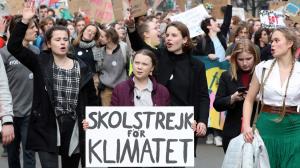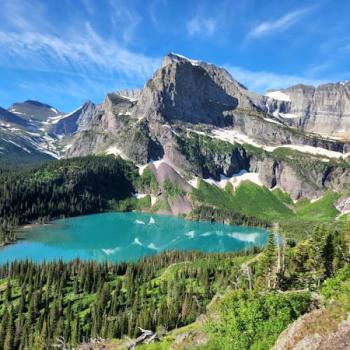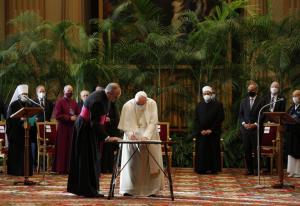“I want you to panic” about climate change — Thunberg

Donald Trump declares a state of emergency when he can’t get what he wants any other way. Some of us recognize true emergencies that have nothing to do with allegedly porous borders. Pope Francis wrote the encyclical Laudato Si, raising the Church’s level of concern about the environment, including climate change. Sixteen-year-old Greta Thunberg, with her school strikes for climate change, has raised peoples’ awareness around the world and brought her numerous awards, including a Chilean “Laudato Si” award. She has received a Nobel Peace Prize nomination. Francis and Thunberg met briefly April 17. Thunberg said the pope supported her climate protests.
Greta Thunberg, climate activist
Greta Thunberg became aware of climate change around age 8, she says. At age 11, she entered a period of depression manifesting as not eating or speaking and was diagnosed with Asperger’s syndrome, OCD, and selective mutism. Since then she has decided—and convinced her parents—to consume no animal products and avoid flying—two activities with large carbon costs. Last year she went public with her “skolstrejk for klimatet” (school strike for climate). Until September 9, the day of Swedish elections, she sat every school day in front of the Swedish Riksdag.
Since then Greta Thunberg has continued to strike on Fridays. She said she was inspired by teen activists at Marjory Stoneman Douglas High School in Parkland, Florida. Students around the world have joined in many such strikes, the largest so far taking place on March 15, with 1.4 million students participating.
These are a few of Greta Thunberg’s accomplishments and awards:
- A Time Magazine citation as one of the world’s 25 most influential teenagers, November 2018
- A TED talk on November 24
- An address to the COP24 United Nations climate change summit, December 4.
- An address to a panel at the World Economic Forum, Davos Switzerland, January 23. This was after a 32-hour train trip, in contrast to over a thousand private jet flights by summit delegates.
- Speeches to the European Economic and Social Committee and to European Commission chief Jean-Claude Juncker, February 21. Juncker responded with a pledge that the European Union would spend billions on climate change.
- Most important woman of the year in Sweden award, March 18
- The German Goldene Kamera Special Climate Protection Award, March 31
- The French Prix Liberté, April 2
- Nomination by three Norwegian parliament members for the Nobel Peace Prize. The three reasoned that global warming unmitigated will cause wars and other conflicts.
Greta Thunberg, the messenger
Greta Thunberg is quite blunt in her messaging. She answers those who say, Why talk about climate change with mere teenagers: “We don’t want to talk with you either. We want you to listen to the scientists.” To those, on the other hand, who say in youth is the hope of the world, she says, “No, by the time we are old enough to have any power in this world, it will be too late.” She’s right about that according to the 2018 IPCC report. We have, now, 11 years left to turn the world’s economy around and essentially half our production of greenhouse gases on the way to zero in 2050, scientists say.
Thunberg speaks about being on the Asperger spectrum. For people like her everything is black or white. People say, No, the world is always shades of gray. But she compares the warming earth to a house on fire. There is nothing gray about it. On her selective mutism she says she speaks when necessary, and that time is now. I don’t know much about selective mutism, but it seems necessity has driven her to speak with conviction. Here she speaks to that TED convention, and here to the COP24 conference.
In defense of her movement of school strikes, she answers critics:
Today we use 100 million barrels of oil a day. There are no politics to change that. There are no rules to keep that oil in the ground, so we can’t save the world by playing by the rules because the rules have to change. Everything needs to change, and it has to start today.(TED talk)
In her TED talk she declined to offer a hopeful conclusion. “Instead of looking for hope,” she said, “look for action. Then and only then hope will come.”
The muted message of Pope Francis and the Church
In the news today cyclone Fani is the most severe storm to hit the Indian subcontinent in two decades. It highlights one of Pope Francis’s warnings about global warming: While rich countries have contributed the lion’s share of greenhouse gases, global warming will harm poor countries most. Greta Thunberg speaks of “climate equity,” and it’s as if she’s echoing the pope.
I live in a small town in Southern Minnesota with lots of Catholics and lots of skepticism about climate change even with the weather changes we see here. We hear what the scientists are saying but very little of what the Church says. Pope Francis made the Church’s position clear in Laudato Si, and he is not the only pope to do so. In fact, the last three popes have spoken strongly about global warming, its human causes, the harm it causes especially to the poor, and our responsibility for God’s creation and future generations. That message is not getting across to enough Catholics.
Greta Thunberg knows that actions speak louder than words. No one would be listening to her if she hadn’t started her campaign with simple acts of civil disobedience—not going to school. The Church knows that, too. She enhances her words on abortion with very public demonstrations, and everybody knows this particular stand of the Church. The Church can and must take the same approach to global warming. Let a 16-year-old Swedish high school student lead the way!
I am well over four times Greta Thunberg’s age. I can only vaguely feel the fears with which she views her own future. But I have children and grandchildren who will share that future. Will it be a future of run-away global warming? And will storms, droughts, and other weather anomalies cause more and more hardship? Will climate-related conflict, poverty, and migration be the main themes of future history? Or will we listen to the prophets among us, including those too young to vote?
Image credit: Bios Urn via Google Images












